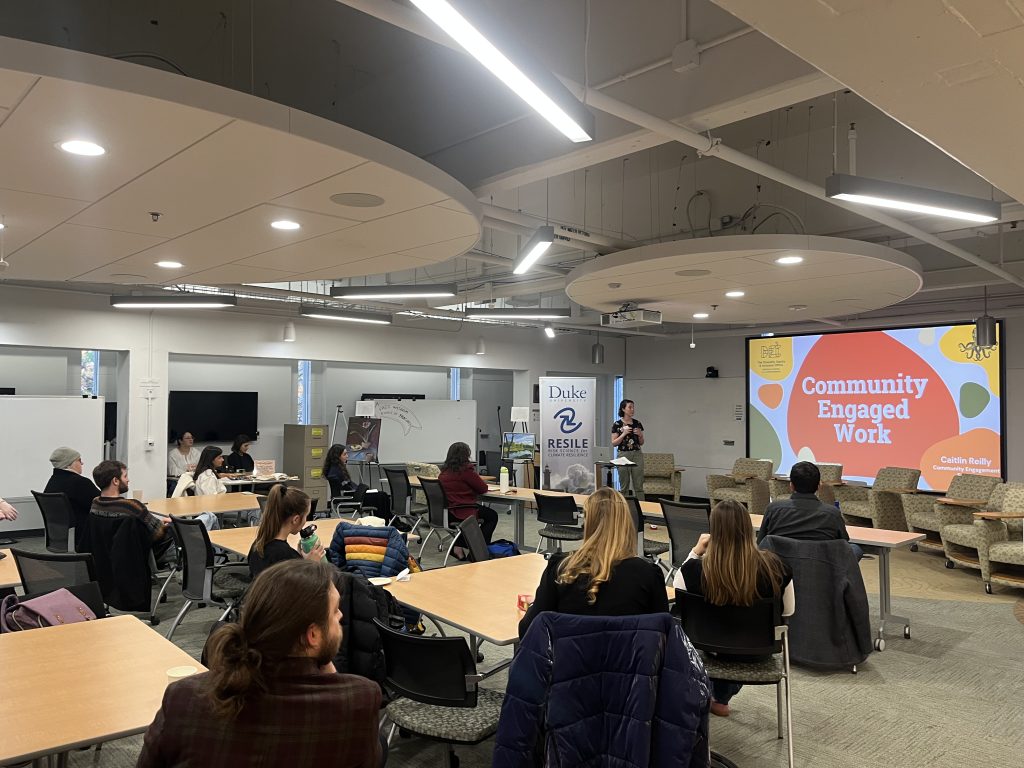The “Resilient Voices” event, hosted by Duke RESILE, saw a turnout of between 20 and 30 attendees, including both campus members and the public.

Caitlin Reilly delivers the Resilient Voices Keynote Address. Alt Text: Caitlin Reilly shares a slide, titled “Community Engaged Work” to a classroom of attendees.
Caitlin Reilly, a Community Engagement Fellow at the Nicholas School of the Environment, delivered the keynote address on climate resilience. Her speech was followed by a panel discussion featuring experts such as Josh Brooks, a partner with Waybright, LLC, a project development, finance, and management platform focused on clean energy, water, and infrastructure service provision, Jordan Fritz, a Senior Program Coordinator in the Pratt School of Engineering at Duke University with foundations in data analysis and meteorology, Chase Locascio, an Asheville native and B. N. Duke Scholar at Duke University, Hector Monterroso, a Civil Engineer from Costa Rica pursuing a Ph.D. at Duke University, and Nicholas Stover, a City and Regional Planner with broad community and international experiences who has recently taken a role with Orange County Planning and Inspections. The audience engaged actively in these discussions, contributing to a lively exchange of ideas.
”The impacts of climate change are felt differently from person to person. The first RESILE event illustrated the benefits of having a wide range of perspectives when discussing the multifaceted challenge that is climate change.” – Chase Locascio, Duke BN Scholar and Panelist.
The event also included a popup art exhibit by “Say the Thing,” which focused on sustainability and creativity using repurposed materials. This exhibit, a collaboration between the Duke University Chapel and the Kenan Institute for Ethics, added a unique element to the event. Research posters and artistic contributions filled the room, enhancing the overall experience and sparking discussion and debate among attendees.
Duke’s Rhodes Information Initiative was acknowledged for their support in making the event possible, through generous contribution of the event space.
“iiD makes its way in the world through partnership, we succeed when our partners are successful, and we are delighted with your success” – Dr. Robert Calderbank, Director of the Rhodes Information Initiative at Duke University.
This event marked the beginning of RESILE’s campus student programming. Initially a MUSER project aimed at fostering a campus conversation on climate change, the event was organized by Duke undergraduate students Charlotte Curlin, Sophie Gower, Ariella Maroni, Taylor Moss, and Sarah Sevilla, and graduate student Sarthak Mehrotra, with support from a recent Duke graduate Pooja Lalwani, under RESILE’s Executive Director, William N. Ferris. The students’ initiative in planning and executing the event were evident and appreciated.
We had one simple goal: Have a campus conversation on diverse, lived experiences with climate change and resilience. The students really took initiative, and this blossomed into so much more. It was rare to see the arts and sciences so organically and authentically intertwined. – Dr. William N. Ferris, Executive Director of RESILE.
Additionally, the event served as the kickoff for RESILE’s first call for submissions for a book on diverse perspectives. Students were also informed of upcoming programming through the Pratt School of Engineering, in the form of the Pratt Summer in Italy opportunity, co-led by Program Coordinator Sandra Trompeo.
The uneven distribution of water today is simultaneously creating hazards when it is too much as in floods or sea level rise or too little in the case of desertification. – Sandra Trompeo, Program Coordinator and Co-Lead of Pratt in Italy.
Attendees and participants came from diverse backgrounds and roles, including the Duke Climate Commitment, the Pratt School of Engineering, the Nicholas School of the Environment, the private sector, and public sector, and more. This diversity enriched the discussions and highlighted the interdisciplinary nature of addressing climate resilience.
Students interested in learning more are encouraged to reach out to RESILE at RESILE@duke.edu.
